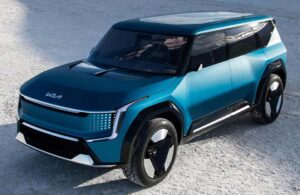Planning to expand its portfolio, Kia has announced to introduce a mini electric vehicle, push volumes up by 50%, drive down cost of EVs and work to build its image as an eco-friendly brand in India.
 Since its debut in August 2019, the Korean automotive brand has quietly surpassed heavyweights Toyota and Honda to build a share of 7% in India’s domestic passenger vehicle market powered by a small range of SUVs; a body style that has remained as the top consumer choice.
Since its debut in August 2019, the Korean automotive brand has quietly surpassed heavyweights Toyota and Honda to build a share of 7% in India’s domestic passenger vehicle market powered by a small range of SUVs; a body style that has remained as the top consumer choice.
The new business plan that is valid through 2030 outlines the roadmap for each of the large global markets, including India, which generates nearly 9% of its global sales and was its fourth single biggest market in the world by the end of 2022.
Kia, which is India’s fifth-largest passenger vehicle brand, is targeting sales volumes of 378,000 units in India by 2030, which if achieved, will be a 51% jump compared to its 2022 sales of 251,000 units.
As the company’s present manufacturing output is around 300,000 units a year, capacity expansion initiatives will have to be taken by Kia to meet the targets.
“We have been growing rapidly in India since the launch in 2019. We will continue to release regional models to generate stable sales growth,” said Ho Sung Song, CEO, Kia at the Investor Day held on April 5.
Mid-size SUV Seltos and compact SUV Sonet are the two volume drives for Kia India. Sonet became its first region-specific product for India that made the company’s management take note and start work on yet another India-led model but powered by electric batteries.
“In India we will be launching a small EV model, optimal for the market to penetrate the Indian market, which will serve as a cornerstone for pioneering emerging EV markets,” Song added.
The new EV, which is set to debut in 2025, will be a compact model defined presently just as ‘A+’. This will be a model that will be unique to India as other large markets like China and Europe are slated to get B, C and D segment models. In India, Kia launched its flagship electric vehicle EV6 in June last year, priced at around ₹60 lakh.
The compact EV segment is getting attention from manufacturers in India after the debut of Tata Motors Tiago EV, which is the cheapest electric car in the country priced at ₹8.7 lakh. MG Motor will be debuting the Comet, a city-centric EV, in a few weeks.
Kia is betting on cost reduction to bring down acquisition cost for the customer and make it more affordable. The cost of improvement of batteries last year, as claimed by the company, was 15%. By applying next generation batteries and optimising cell chemistry, the company plans to further cut cost by 40% by 2030.
“We will continue to increase brand credibility by expanding experiential marketing and engaging in social contribution activities to build an eco-friendly image,” Song added.
The A+ EV from Kia will be part of the 15-model global line-up planned by the company by 2027. Kia is targeting 4.3 million units in global sales and 1.6 million units in EV sales by 2030.

